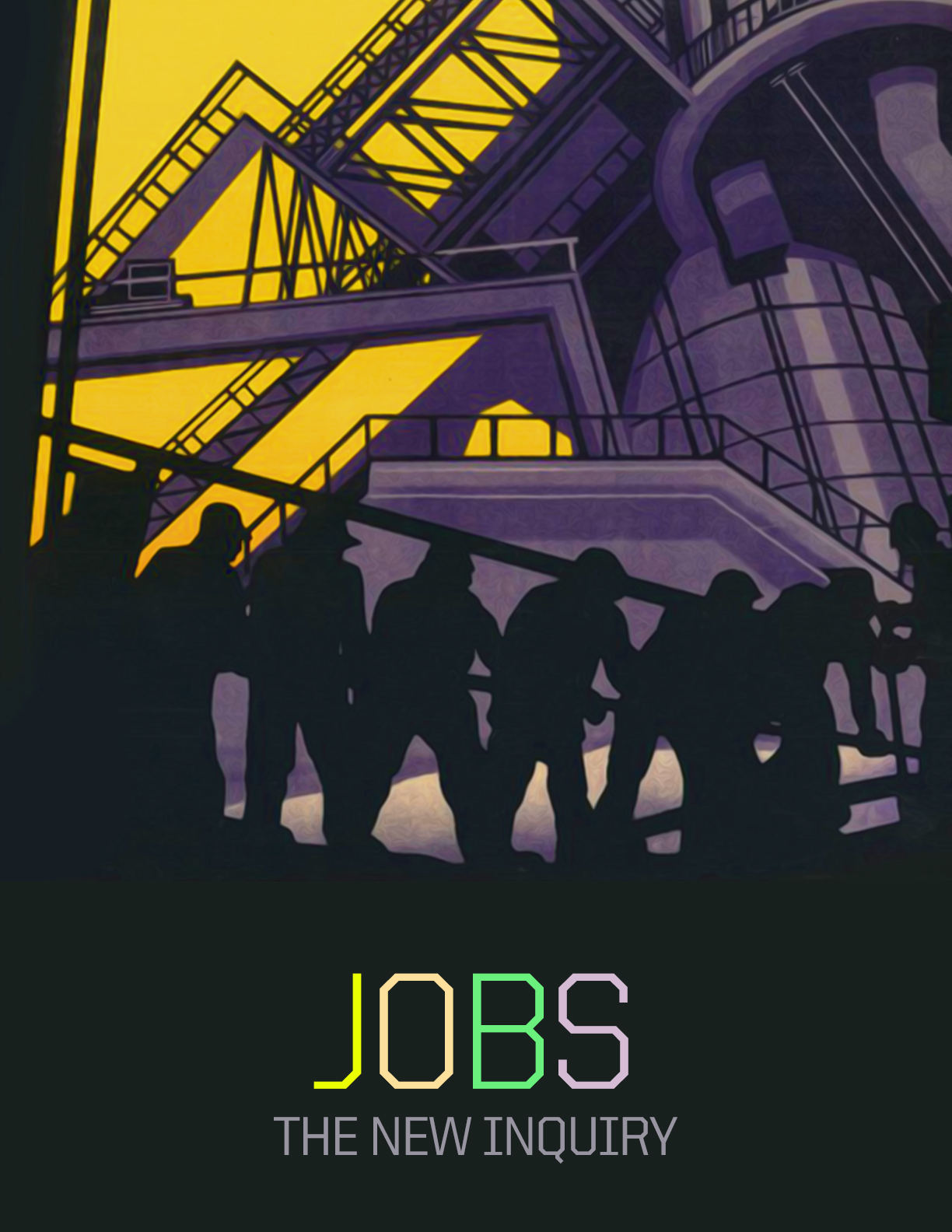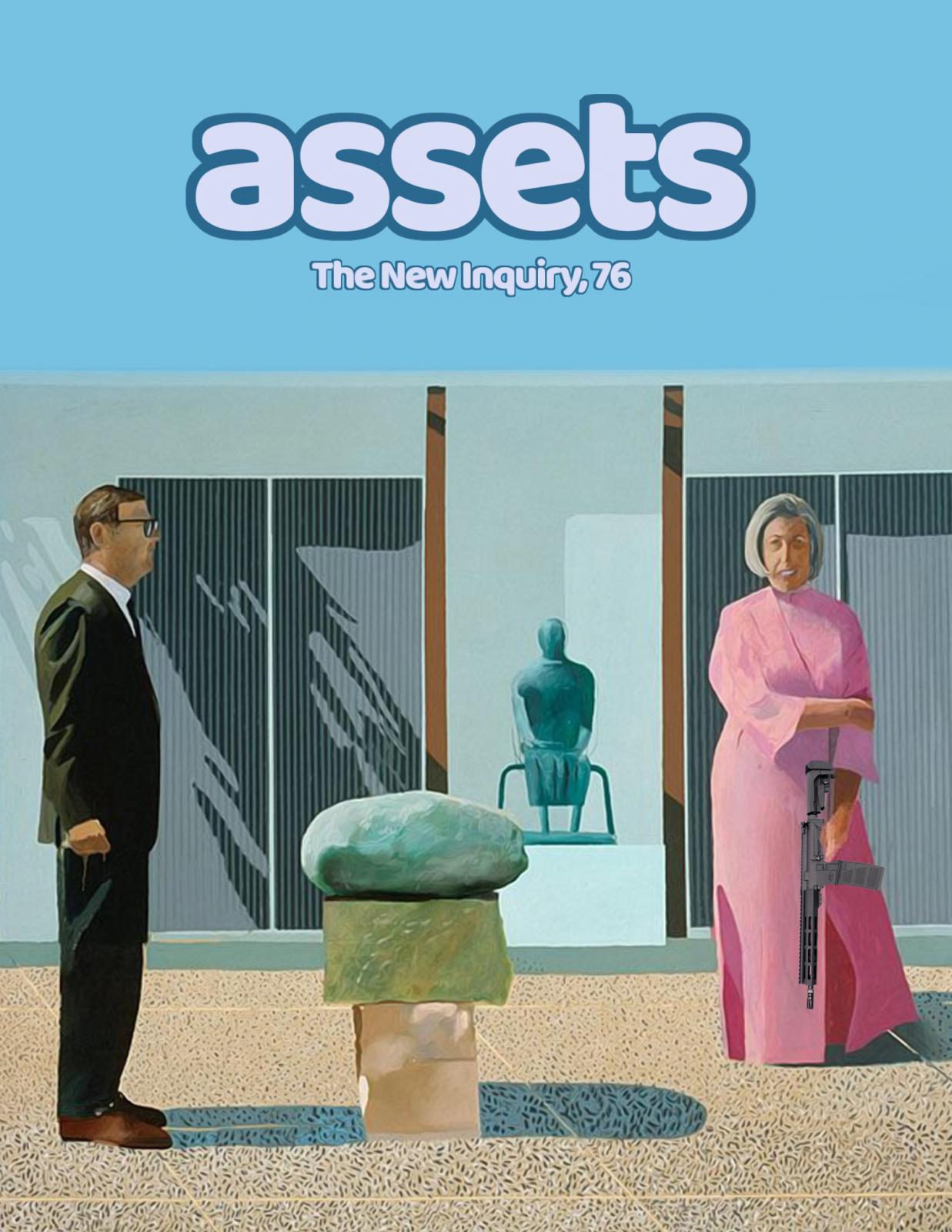Jobs
Editors' Note
Zadie Smith recently described a Manhattan social encounter in the New York Review of Books’s NYR Daily by pointing out that among the crowd (which included Smith in a “denim jumpsuit,” a person with a skateboard, and another in a “custodian’s uniform”), only “two of us were dressed for real jobs.” Smith doesn’t mention what exactly the “real” workers were wearing—and she doesn’t need to. Despite their diminishing availability, a Real Job still widely signifies something like a nine-to-five, a suit, and a briefcase—not a skateboard.
But the construction of reality takes work. The faint differences between a Real Job and something else—say, the difference between a hobby and a career, or a gig and, in Silicon Valley–speak, “purposeful work”—are not just semantic. As life and labor become increasingly precarious, some baristas are part of a writer’s union, some of us take on gigs in order to support our paid and unpaid roles as students, teachers, and caregivers, and many of us don’t have jobs at all. People with so-called Real Jobs are often paid more, paid on time, and offered better benefits and security than the masses who increasingly hunt for some combination of what we might call gigs, internships, or a TaskRabbit account.
The received narrative is that millennials don’t have Real Jobs, and perhaps never will. But that certainly doesn’t mean we don’t work; in fact it might be our only claim. In this issue, we explore how what counts as labor and how much it’s worth continues to be a crucial site of contestation under neoliberalism. If everything is work, will we ever get a break?
As economic conditions become more unsustainable for the working classes, tech elites are experimenting with ways to quell unrest by supposedly attempting to lessen the drudgery of the everyday. Criticizing the tech moguls currently advocating for universal basic income (UBI), Carmen Petaccio writes that “for them, exploratory UBI programs aren’t practice runs for a protosocialism that could counteract the woes of late capitalism. Rather, they are beta tests for deceptive public policy that could sustain late capitalism forever.”
Many of the miseries of global capitalism are unequivocally physical. While the “new workforce” is supposedly agile, jobs often inflict bodily pain on workers. Writing on back pain and attempting to deindividualize it, Aaron Neiman asks, “Why is it so difficult to picture the nation’s public-health apparatus addressing this problem as a legitimate medical crisis?” In “Whose Time Is It, Anyway?” Sophia Cross examines the “feel-good commuter story” in which a low-wage worker walks miles to get to work and back. Based on the brutal notion that we must endure anything for a job—and that such sacrifice is a moral good—the uneven allocation of time becomes depoliticized.
This issue features several interviews that outline conversations in contemporary labor and advocate for a collective response to shared conditions. Lena Afridi, Christina Fox, Farah Khimji, and Lena Solow discuss labor organizing and workers’ rights in a roundtable forum—and emphasize the need to center people of color, undocumented people, and queer people. Zaina Alsous brings together organizers of the Union of Radical Workers and Writers, the Resist Retail Nihilism conference, and the Worker Writers School to think about what organizing poets looks like. It’s not what it might seem. As Mark Nowak says in the interview, “I’m not sure I’d separate poets or writers from everyone else. If we really want to ‘actually shut shit down,’ that’s a massive project. We need poets and writers, sure, but we need workers and students and everyone.”
For that job, we need everyone, and we need everything. In an interview with Nick Smaligo linking modern antifa to the 1970s autonomous movements in Germany, George Katsiaficas explains that “the lesson from Europe is that broad strata of people need to be mobilized: Thousands and thousands of people who are against racism and against hate need to be in the streets.”
As we can glean from the German word instandbesetzen, meaning “to renovate and occupy,” squatters knew that it is not only history that must be occupied but also the future. Owing to the symbol of futurity endowed in the figure of the child, certain ideals of childhood have been instrumentalized to help us cope with our present and “the future [young people] promise can offer parents a source of meaning for the toil they suffer.” In an interview with political theorist Paul Rekret about his new book Down with Childhood, we learn how “as the distinction between labor and leisure is breaking down, so too is the concept of childhood.”
While some things are breaking down in contemporary American postindustrial society, others are only solidifying. In “The Management Estate,” Alfredo F. Riley argues that journalists and pollsters are a managerial class who tout themselves as the overseers of the public sphere. In this vein, “facts” are violent claims to a cold objectivity that is in fact highly subjective: “white, cisheterosexual, male, able-bodied, bourgeois, Christian, etc.” At Politico, writers and designers are subject to social-media screening that tries to maintain the image of a trusted (read: normative) American journalistic opinion.
In “The Dream Workers,” Eli Mandel reviews the recent publication of Vladimir Nabokov’s dreams. “We need not lie on the couch to see that dreams are a kind of nocturnal labor,” he writes. “Dreamwork has an affinity to artwork: Dreams are our only involuntary creative act. No wonder, then, that the dreams of writers and artists—of professional daydreamers—have a special pull.” Dreaming might be a lesser mode of employment, but it’s certainly the most ubiquitous.
Rachel Elizabeth Fraser considers the labor animals perform in “Animal Citizens, Animal Workers,” and, in a review of Blood, Sweat, and Pixels, Mike Thomsen turns to the behind-the-scenes work of making hit video games. When the line between producer and consumer is blurred, being considered an employee becomes a “privilege” one is endowed with as reward for a “good” work ethic.
This issue’s special project features Francis Tseng’s dystopian simulator The Founder, which, like some jobs, you can download to play on your phone. “Whether we arrive at a utopian world without work or a dystopia full of only the unemployed and their overseers will depend on whether we get there through Silicon Valley disruption or revolt from below,” senior editor Willie Osterweil writes of the game’s darkly satirical politics.
Another type of prosumerism is at play in creating the brands we love (the Kardashians) and the brands we love to hate (Coke Zero), as Bradley Babendir explains in his reading of Liza Featherstone’s Divining Desire: Focus Groups and the Culture of Consultation. “Ordinary people are listened to more than ever,” he notes of focus groups, “even as they have less and less real power.”
Still, because we continue to learn from the combined histories, practices, and imaginaries of feminism, black studies, Marxism, and anti-colonialism, we know there is untold power in the ordinary. As the late scholar of the world-making capacities of the masses C. L. R. James said not long before he died, “You never know when it is going to explode. The revolutionary movement is a series of explosions when the regular routine of things reaches a pitch where it cannot go on.”
Featuring
-
Editors’ Note, Vol. 65: Jobs
-
Universal Basic Bullshit
-
What Was the Child?
-
Whose Time Is It, Anyway?
-
The Management Estate
-
The State of the Unions
-
Dream Workers
-
From Autonomen to Antifa
-
A Pain in the Back
-
Animal Citizens, Animal Workers
-
Fan Nonfiction
-
The Founder
-
Groupthinkers
-
A Union of Poets





